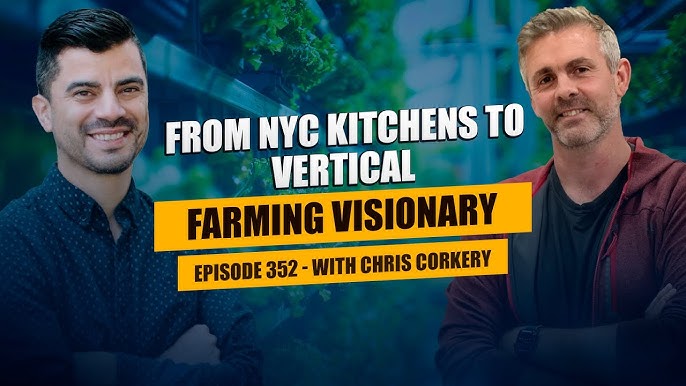Key Takeaways
- Chris Corkery, CEO of Hundred Acre, shares insights into his transition from high-end restaurants to urban vertical farming.
- His experience sourcing fresh produce in New York City’s farmers markets led to an interest in improving food supply chains.
- Hundred Acre operates as a B2B vertical farm, supplying salad blends and basil to wholesale buyers.
- Corkery highlights challenges in scaling vertical farms, including high startup costs, industry knowledge gaps, and buyer hesitancy.
- The farm is expanding, with plans to launch a larger facility in Milwaukee.
From Fine Dining to Urban Farming: A Conversation With Chris Corkery
In a conversation with Harry Duran on the Vertical Farming Podcast, Chris Corkery discussed how his experience as a chef in New York City influenced his interest in food sourcing and supply chain resilience. While working in high-end restaurants, Corkery became familiar with the demand for high-quality, locally sourced produce.
“I was scrambling to get to the farmers markets early in the morning, trying to beat other chefs to the best produce. That experience made me realize the value of fresh, high-quality ingredients and the effort farmers put into growing them.”
This led to an interest in bringing farms into urban centers permanently, providing a consistent and local source of fresh produce while creating new job opportunities in food production.
“What if we take it a step further and actually bring the farm to the city permanently? Not just as a point of sale, but as an actual growing space.”
Establishing a Vertical Farm in Milwaukee
Choosing Milwaukee as a Location
Corkery initially explored New York City as a base for a vertical farming venture but found that high real estate costs made large-scale operations difficult. After assessing other locations, he identified Milwaukee as a city with available infrastructure, an emerging food scene, and opportunities to address local food accessibility challenges.
- Lower real estate costs allowed for a larger-scale facility.
- The city has a strong agricultural and manufacturing history.
- There was demand for fresh, locally grown produce in the area.
“Milwaukee had a lot of empty buildings due to the exodus of manufacturing. It also had a strong food scene and a community that could benefit from local food production.”
Product Selection: Salad and Basil
Hundred Acre’s approach focused on offering a limited number of high-quality products to streamline production and maximize market opportunities.
- Salad blends were chosen as a high-demand, widely used product.
- Italian basil was selected as a premium product with strong profit margins.
“The salad is like our Trojan horse—it gets us into restaurants, and then we upsell them on basil, which has a better profit margin.” Chris Corkery said.
Over time, Hundred Acre has expanded its product line, now including:
- Retail offerings in grocery stores.
- Premium sauces made in collaboration with chefs.
- New product lines such as microgreens and butterhead lettuce.
Challenges in Scaling Vertical Farming
1. High Startup Costs and Unforeseen Expenses
- Initial investment was three times higher than expected.
- Inflation, supply chain disruptions, and labor shortages added unexpected costs.
- Corkery self-funded much of the project and is now looking for external investment to support growth.
2. Limited Industry Knowledge Sharing
- Corkery noted that many vertical farming companies operate in secrecy, making it difficult for new entrants to access reliable industry data.
- The lack of open knowledge-sharing slows business development and scalability.
“A lot of companies act like they’re curing diseases when they’re just growing lettuce. The lack of shared knowledge slows down progress.”
3. Communicating the Value of Indoor-Grown Produce to Buyers
- Many wholesale buyers prioritize cost over quality, making it difficult to promote locally grown, high-quality alternatives.
- Buyers are accustomed to unpredictable supply chains and may be hesitant to switch to a new supplier.
“We provide a consistent product every week, 52 weeks a year. That kind of reliability is invaluable, but getting buyers to see that takes time.”
Community Engagement and Local Partnerships
Hundred Acre operates with a focus on community-driven initiatives, including:
- Hiring locally and providing jobs in urban agriculture.
- Maintaining an open-door policy to encourage public engagement.
- Partnering with food banks like Feeding America to increase food accessibility.
Corkery also noted that local and state agencies have provided support, with grants and funding from USDA-backed initiatives helping expand research and local food infrastructure.
“Government support helps validate our work. These subsidies aren’t about profits; they help us push forward R&D and strengthen local food systems.” Chris Corkery said.
Lessons Learned & Future Plans For Hundred Acre
Reflections on the Journey
When asked what he would have done differently, Chris Corkery identified key lessons:
- Starting smaller – Avoiding overextending resources early on.
- Better planning – While some challenges were unavoidable, more preparation could have helped.
- Building a strong support network – Bringing in advisors and co-founders earlier to share responsibilities.
“This was never supposed to be a one-person show. I’m now working on making it more of a team effort.” said Chris Corkery
What’s Next for Hundred Acre?
- Opening a second facility in Milwaukee—four times the size of the current farm.
- Expanding retail distribution and developing new products.
- Exploring investor partnerships to fund the next stage of growth.
“We’ve proven the model works. Now, it’s time to scale.” Hundred Acre is currently looking for investors and collaborators to support its expansion plans. “We’re looking for partners who believe in what we’re doing and want to be part of building the future of urban agriculture.”


